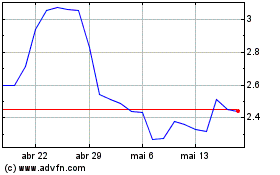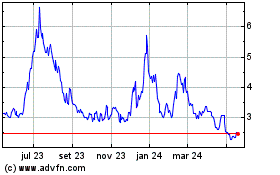Miners face Bitcoin halving challenges
The upcoming Bitcoin halving (COIN:BTCUSD), scheduled for April
2024, may pose more challenges for cryptocurrency miners compared
to previous halvings. Mining experts say that around half of
miners will struggle due to high electricity costs and accumulated
debt. Previous halvings have been followed by big Bitcoin
price rallies, but the upcoming halving could be problematic for
certain miners. Many miners are trying to prepare in advance,
looking to reduce energy costs, secure prices with suppliers and
implement financial protection strategies. Riot Platforms
(NASDAQ:RIOT), for example, plans to expand its mining capacity
before the halving by acquiring new miners.
HIVE Blockchain produced 259 Bitcoins in June
HIVE Blockchain Technologies (NASDAQ:HIVE) announced that it
produced 259 bitcoins in June, with an average of 76.6 bitcoins per
Exahash. The average hashrate was 3.38 EH/s, and the company
produced an average of 8.6 bitcoins per day. The company’s
current balance is approximately 1,957 bitcoins. HIVE’s mining
capacity ended the month at 3.3 EH/s. Bitcoin mining
difficulty ended the month about 1% lower than the start of the
month, taking a toll on the company’s gross profit margins.
BTC price prediction elevated by Standard Chartered
Standard Chartered predicts that Bitcoin will hit the $50,000
mark later this year and reach new highs in 2024, according to a
report released by the bank. They highlight the BTC price
recovery and the shift in the narrative around the
cryptocurrency. The report predicts that BTC/USD will reach
$50,000 in 2023 and $120,000 by the end of 2024. It is believed
that supply and demand dynamics will favor bulls as miners sell
less BTC, creating an imbalance of supply and demand. Standard
Chartered is also involved in the cryptocurrency industry through
its crypto custody platform Zodia. The bank’s bullish
prediction is seen as a sign of growing institutional interest in
Bitcoin.
Vitalik Buterin highlights scalable solutions for the Bitcoin
network
Vitalik Buterin, co-founder of Ethereum (COIN:ETHUSD), expressed
the opinion that the Bitcoin network needs scalable solutions such
as zero-knowledge rollups (ZK-rollups) to become more than just a
payment network. During an event on Twitter, Buterin
highlighted the importance of these solutions to increase the
scalability of Bitcoin. He mentioned Optimism and Arbitrum,
which are successful examples of rollups used on Ethereum, as case
studies that could be applied to Bitcoin. Buterin also praised
Bitcoin’s Lightning Network as an important Layer 2 solution for
scalability.
Seamless inflow into digital asset investment products
For the third consecutive week, there were strong inflows into
digital asset investment products, with a total of $136 million
entering the market. In the last three weeks, total inflows
into institutional cryptocurrency investment products reached $470
million, offsetting the previous nine weeks of outflows and
resulting in a positive net inflow of $231 million for the
year. Bitcoin remains the top choice for investors, while some
altcoins have also attracted inflows. Blockchain stocks also
saw a huge influx of $15 million.
Cega Finance expands structured investment product to Arbitrum
DeFi derivatives platform Cega Finance has expanded its
structured investment product to the Layer 2 Arbitrum network,
allowing users to stake on the stablecoin USDC
(COIN:USDCUSD). Cega claims its “L2” vault can generate an
estimated APY of up to 63% and loss protection of 50%. Cega’s
structured investments are less complex than traditional finance
and offer advanced trading strategies, higher yields and protection
against market downturns. The company chose Arbitrum due to
its affordability, low fees and familiarity with
Ethereum. Cega plans to expand to other chains in the
future.
Justin Sun’s massive withdrawals of Ether tokens raise concerns
The recent withdrawals of 30,000 stETH tokens (COIN:STETHUSD)
made by Chinese businessman Justin Sun, founder of Tron, have
raised concerns among users of the ETH platform Lido. The
value of these withdrawals was around $55.8 million and took place
in two different wallets belonging to Justin Sun. The reason
behind these massive withdrawals is still unknown and the
businessman has not publicly commented on the matter. Despite
these sales, Justin Sun is still the biggest holder of stETH, with
around 260,000 tokens left, worth $484 million. The
withdrawals do not appear to have significantly impacted the market
price of stETH.
Grayscale adds Lido token to its DeFi fund
Digital asset management firm Grayscale has added the Lido
staking protocol governance token to its DeFi fund. The
company adjusted the fund’s portfolio by selling certain amounts of
the existing assets and using the resources to buy the Lido token
(COIN:LDOUSD). Now, Lido occupies the second position in the
Grayscale DeFi fund, with a 19.04% stake. Lido has gained
popularity as a proof-of-stake net staking solution for
cryptocurrencies, with over 10 million ETH staked through its
pool. Grayscale also acquired voting power on Lido governance
proposals.
Mantle Network proposes $200 million ecosystem fund
Mantle Network has proposed the creation of a $200 million
ecosystem fund to support the development of decentralized
applications on its Ethereum Layer 2 network over the next three
years. The proposal seeks community approval to allocate $100
million from Mantle’s treasury and seek an additional $100 million
from strategic partners. With current favorable votes,
approval appears imminent. BitDAO, now renamed Mantle, is a
decentralized autonomous organization that owns one of the largest
community treasures in cryptocurrencies, including Mantle tokens,
ether and stablecoins.
Worldcoin expands project in Spain with World ID
Spain has become Europe’s largest operating market for Sam
Altman’s Worldcoin as the project expands into the
country. Worldcoin decided that Spain would be the next market
to gain access to World ID, a privacy-preserving Proof of
Personality protocol. The Tools For Humanity (TFH) team joined
tech associations Tech Barcelona and Adigital. The project
noted that there were also numerous World ID entries in
Portugal.
Hiring in Hong Kong’s cryptocurrency sector is still down
While cryptocurrency companies are eager to enter Hong Kong,
hiring in the industry is still down, according to recruiting
executives. Demand for technical talent has dropped
significantly since the cryptocurrency market crash. Although
the rules have changed, risky activity is still low but is expected
to increase in the future. Companies that establish themselves
in Hong Kong will face a war for talent, as the local talent pool
is scarce. The stability of TradFi is no longer as attractive
as it used to be, and many people are willing to try opportunities
in the crypto space and Web3.
Ripple recognized by Bank of America for its impact on cross-border
payments
Bank of America (NYSE:BAC) has recognized Ripple as a company
making a significant impact with blockchain in cross-border
payments. While blockchain has limited impact on cross-border
payments, Ripple is an exception. BofA highlights the
emergence of SWIFT GPI as the preferred solution in the
Asia-Pacific region. APAC is leading the adoption of financial
technologies and moving towards eliminating physical cash,
introducing digital options such as QR codes, real-time settlements
and central bank digital currencies.
24 Central Banks plan to launch digital currencies by the end of
the decade
According to a survey by the Bank for International Settlements
(BIS), around 24 central banks in emerging and advanced economies
plan to launch digital currencies by the end of the
decade. The majority of these central bank digital currencies
(CBDCs) will be aimed at retail, with eleven central banks joining
others that already have digital currencies in
circulation. Additionally, nine central banks are considering
launching CBDCs for use in the wholesale sector. BIS also
warned of the possible threat to financial stability if crypto
assets, including stablecoins, are widely used for payments.
US presidential candidate Robert F. Kennedy Jr. owns Bitcoin
Democratic US presidential candidate Robert F. Kennedy Jr.
previously denied being an investor in Bitcoin, but recent
financial documents reveal that he has between $100,001 and
$250,000 worth of Bitcoin. This revelation contradicts his
previous statements of not being involved with Bitcoin. There
have been concerns raised about a possible conflict of interest,
but the Kennedy campaign has stated that there is no
conflict. Kennedy continues to voice his support for Bitcoin,
deeming it a bulwark against manipulation of the money supply and a
path to greater government transparency.
Matrixport appoints Mo Zhou as Head of US operations
Matrixport, a Singapore-based cryptocurrency trading and lending
platform, has announced the appointment of Mo Zhou as the new head
of its US operations. Mo Zhou will lead the company’s
institutional business lines in the country, assuming the position
previously occupied by Anthony DeMartino, who will act as a
consultant. Matrixport continues to maintain its international
growth plans in the US, despite regulatory issues in the
country. Zhou is a Harvard-educated attorney with experience
in derivatives and mergers and acquisitions.
Arkham Project launches on Binance Launchpad
Binance has announced that the Arkham project (ARKM) will launch
as the 32nd project on its launch pad, Binance Launchpad. The
Arkham Token Sale will be capped at $2.5 million and users will be
capped at $15,000 to purchase ARKM tokens. The monitoring
period for users’ BNB balances will begin on July 11th, and the
final allocation of tokens will be determined on July
18th. Arkham is a blockchain analytics platform that provides
data on entities and individuals in the crypto market.
Savl launches Community feature for cryptocurrency users
Cryptocurrency wallet app Savl has launched the Community
feature, which aims to create a supportive and vibrant ecosystem
for cryptocurrency users. Users can create custom profiles,
interact with creators and brands, participate in discussions and
collaborate on projects. The Community aims to increase
engagement, provide networking and collaboration opportunities, and
connect businesses and cryptocurrency users. Savl seeks to
create a welcoming community and promote blockchain
socialization.
French startup Narval raises $4 million
French startup Narval raised $4 million in an initial funding
round led by BlockTower VC. The company is developing a
platform for web3 wallets, which will allow organizations to manage
and use a variety of digital assets, including cryptocurrencies and
NFTs. Narval offers a granular policy engine that allows
organizations to precisely control access permissions to digital
assets. With the new funds, the startup plans to expand its
team and continue platform development, as well as boost its
marketing efforts. Narval’s solution aims to provide a
governance layer to facilitate the secure use of digital
assets.
Wimbledon NFTs launched in collaboration with Andy Murray and Refik
Anadol
British tennis player Andy Murray, Wimbledon Tennis Tournament
and digital artist Refik Anadol have collaborated to launch an
official Wimbledon non-fungible token (NFT) on the Ethereum
blockchain. The project, called ‘The Exhibition’, is a
data-driven work of art representing all of Murray’s Wimbledon
matches throughout his career. The data was processed by
scientists and developers to create a visually stunning
piece. NFT holders will have the opportunity to purchase a
physical printed edition of the artwork. The Open Edition was
released on July 7th – exactly 10 years after Murray’s first
Wimbledon win. Price is $147, with 161 pieces minted. The
sale will end on July 16th.
HIVE Digital Technologies (NASDAQ:HIVE)
Gráfico Histórico do Ativo
De Mar 2024 até Abr 2024

HIVE Digital Technologies (NASDAQ:HIVE)
Gráfico Histórico do Ativo
De Abr 2023 até Abr 2024
